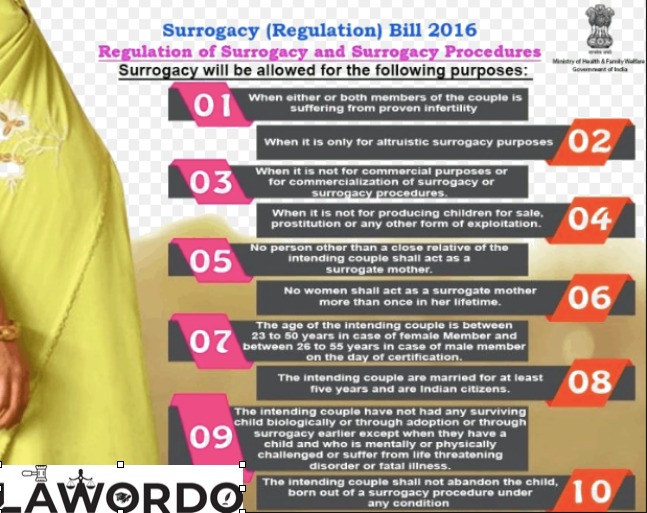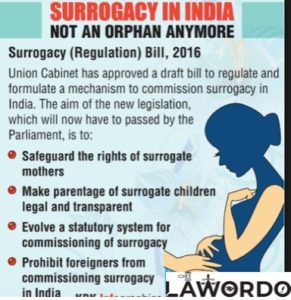THE SURROGACY (REGULATION) BILL, 2016 – AN OVERVIEW
Lok Sabha Passes Surrogacy Regulation Bill to put an end to Commercial Surrogacy
The Lok Sabha yesterday passed the Surrogacy (Regulation Bill), which was introduced in 2016. The Law Commission of India, in its 228th Report, had recommended prohibition of commercial surrogacy by enacting a suitable legislation. The statement of objects and reasons of the Bill says “Due to absence of legislation to regulate surrogacy, the practice of surrogacy has been misused by the surrogacy clinics and doctors, which leads to rampant of commercial surrogacy and unethical practices in the said area of surrogacy”.
Clause 2(f) defines ‘commercial surrogacy’ as commercialization of surrogacy services or procedures or its component services or component procedures including selling or buying of human embryo or trading in the sale or purchase of human embryo or gametes or selling or buying or trading the services of surrogate motherhood by way of giving payment, reward, benefit, fees, remuneration or monetary incentive in cash or kind, to the surrogate mother or her dependents or her representative, except the medical expenses incurred on the surrogate mother and the insurance coverage for the surrogate mother’.
Clause 35 imposes total prohibition of commercial surrogacy, and defines it an offence. Practicing commercial surrogacy, providing services in relation to that, managing surrogacy agencies without legal registration, advertisement of commercial surrogacy services, exploitation of surrogate mothers, selling of human embryos etc. are treated as offences.

PUNISHMENT – MAXIMUM 10 YRS OR FINE OR BOTH
Only altruistic surrogacy permissible
The Bill allows only altruistic surrogacy, which is surrogacy services given by a person who is genetically related to either of the intending parents, without any monetary intent.
As per clause 2(b), “altruistic surrogacy” means the surrogacy in which no charges, expenses, fees, remuneration or monetary incentive of whatever nature, except the medical expenses incurred on surrogate mother and the insurance coverage for the surrogate mother, are given to the surrogate mother or her dependents or her representative; Only a woman who is genetically related to the intending couple can be a surrogate mother.
Surrogacy services only for legally married Indian couple
The Bill seeks to demark surrogacy services only to legally married Indian couple, who are married for a period of at least 5 years.
‘Couple’ is defined as ‘legally married Indian man and woman above the age of 21 years and 18 years respectively’ in Clause 2(g).
This means foreigners, same-sex couples and live-in partners cannot opt for surrogacy. The couple has to be clinically certified as infertile in order to legally competent for surrogacy services.
Infertility is defined in the Bill as inability to conceive after five years of unprotected sex or other proven medical condition preventing a couple from conception, as per Clause 2(p).
The couple must be between the age of 23-50 years and 26-55 years for female and male, respectively. The intending couple should not have had any surviving child biologically or through adoption or through surrogacy earlier. However, if the surviving child is medically certified to be mentally or physically challenged, or as having life threatening diseases, the couple can avail surrogacy services.

Surrogacy only once in lifetime
A woman can be a surrogate mother only once in life time. Informed consent (not to be obtained by force, fraud, misrepresentation or coercion) of the woman in prescribed written form is necessarily required for becoming surrogate mother.
Prohibition to abandon child
The bill forbids abandoning the child born through surrogacy. The child will be deemed as a legal offspring of the intending couple.
Prohibition of abortion
The surrogate mother cannot be forced to abort the child by any person or agency.
Surrogacy clinics to be registered
Surrogacy services can be provided only be clinics which are registered in the manner provided in the Bill. Authorization will be given by the appropriate authority only after satisfaction that such clinics are in a position to provide facilities and can maintain equipment and standards including specialized manpower, physical infrastructure and diagnostic facilities as may be provided in the rules and regulations.
Surrogacy Board
The Bill comprises Surrogacy Board at National level. The Board is to advice the Union on surrogacy policy and to review and keeps a watch on the implementation of the law.
It is also proposed to constitute Surrogacy Boards at the State and Union territory level to perform similar functions in respective States and Union territories.

WHY THIS INITIATIVE?
The half mothers of Anand
- India has an estimated 20-25 million infertile couples, for many of whom assisted reproductive technology (ART) represents a solution to their problem. For infertile foreigners and non-resident Indians (NRIs), ART in India is a relatively inexpensive proposition.
- Local clinics in India promote surrogacy, to flourish business
- India is considered as a center point for surrogacy
- Women are forced to go under surrogacy because of illiteracy, poverty, unemployment and male chauvinism.
- GUJARAT (ANAND DISTRICT) – Focal point in India.
DARK SIDE OF ANAND (EMPIRICAL STUDY)
Farzana, 30, separated from her husband many years ago. With the money that she received from her first surrogacy, she bought some land in her village. The second time round, she plans to put the money in her daughter’s name.
Manju, who used to work in a sari shop before she took up surrogacy because at her old job, a 12-hour shift got her Rs 10,000 a month. Other residents, dressed in loose, flowy gowns, agree that surrogacy pays better than any of the other jobs that they can take on. A surrogate mother gets an assured Rs 4 lakh per child and 25% extra, in case of twins.

THE START
An adherent of the latter position, advocate Jayshree Wad is behind a recent PIL terming surrogacy contracts as “illegal, and violative of the fundamental rights guaranteed to the Indian Women under Article 21 of the Constitution of India”. The petition, filed in February this year, has resulted in the recent ICMR notification, and a fervent debate on the ethics of surrogacy arrangements.
Gray Areas in the BILL
Delhi-based advocate Anurag Chawla of Surrogacy Laws India feels that the big problem in the Bill remains the “discrimination” between foreign couples, who cannot access surrogacy, and PIOs, OCIs and foreigners married to Indian citizens, who are allowed to do so. “If the idea is to stop unethical practices, how will banning one group help the cause?” he asks, pointing out that the Bill states that compensation paid by Indian couples would be different from that paid by OCI, PIO or NRI, and a foreigner married to an Indian citizen.
SURROGACY REGULATION BILL, 2016 – http://164.100.47.4/BillsTexts/LSBillTexts/Asintroduced/257_LS_2016_Eng.pdf

https://www.lawordo.com/

Hmm it seems like your website ate my first comment (it was extremely long) so I guess I’ll just sum it up what I wrote and say, I’m thoroughly enjoying your blog. I as well am an aspiring blog writer but I’m still new to everything. Do you have any suggestions for beginner blog writers? I’d genuinely appreciate it.